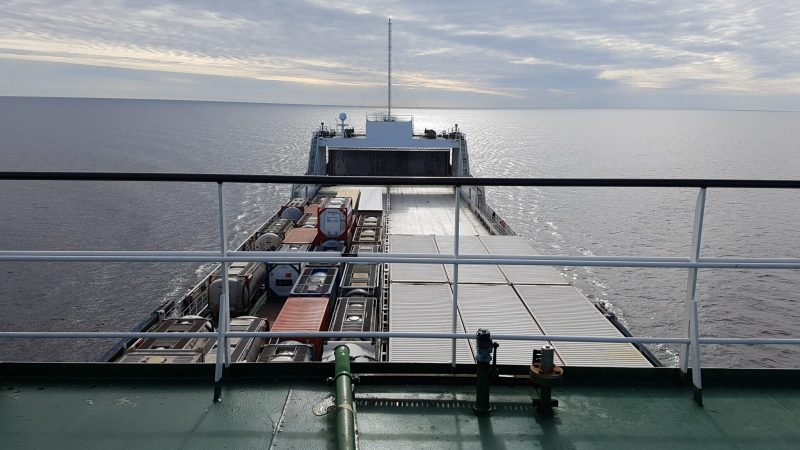In order to reduce greenhouse gas emissions from shipping, the International Maritime Organization (IMO) has revised its climate protection strategy. With the 2023 strategy to reduce greenhouse gas emissions from ships,[1] the IMO is setting more ambitious targets than before. IKEM welcomes this decision, but in the following statement urges additional efforts towards the 1.5 degree target.
More ambitious emission reduction targets for the shipping industry
According to the now revised IMO strategy, greenhouse gas emissions from international shipping should already reach net zero by 2050. In addition, there are indicative checkpoints to achieve 20% as well as to target 30% emission reductions by 2030. A 70% reduction is to be achieved by 2040, with an 80% target. Finally, the share of zero- or near-zero emission technologies, fuels, and energy sources in the energy consumption of international shipping should be at least 5% by 2030, with a target of 10%.
The first strategy to reduce greenhouse gas emissions from ships, adopted in 2018,[2] aimed to reach the peak of total emissions as quickly as possible. In addition, the strategy envisaged the reduction of total annual emissions by at least 50% by 2050. To achieve this, the CO2 intensity, i.e. the CO2 emissions per transport unit in international maritime shipping, should have reduced by at least 40% on average by 2030. By 2050, the IMO envisioned a 70% reduction in CO2 intensity, with the reference value being emissions from 2008.
To achieve the new 2023 targets, medium-term measures will be implemented. These include the introduction of new fuel standards to gradually reduce the greenhouse gas intensity of marine fuels and the implementation of a pricing mechanism for maritime greenhouse gas emissions. Further measures, such as a levy system, are currently under discussion and have strong support from state delegates. Medium-term measures are planned to be adopted within two years, with their implementation set for no earlier than 2027.[3]
Remaining ambition gaps and ambiguities
The tightening of the targets testifies to a significantly higher level of ambition, which is to be welcomed. The Paris Climate Agreement aims to limit global warming to well below 2°C above pre-industrial levels, with efforts to limit it to 1.5°C. The target of net zero emissions by 2050 puts the IMO strategy on a path consistent with the expanded 2°C target of the Paris Climate Agreement.[4] The targets for the share of zero-emission technologies in energy consumption are also an important step in stimulating early investment in technologies needed for climate-neutral shipping.
However, the IMO strategy revision falls short of the level of ambition needed to meet the more ambitious 1.5°C target of the Paris Climate Agreement. The emissions reduction path of the revised strategy would lead to an overshoot of the emissions budget remaining for the 1.5°C target as early as about 2032.[5] To meet the Paris 1.5 C target, emissions reductions of 36% by 2030 and 96% by 2040 are required.[6]
For such an ambitious reduction in emissions to succeed, early investment in climate-neutral technologies and fuels is needed. Particularly in the initial phase of the transition to sustainable fuels, market-based mechanisms such as a levy system are an important tool to compensate for the price difference compared to conventional fuels.[7] However, a pricing mechanism that enters into force in 2027 at the earliest – as envisaged in the IMO strategy timetable – comes too late to stimulate significantly increased energy efficiency measures and investment in sustainable fuels at an early stage, as is required to achieve a 36% – or even 20% – reduction in emissions by 2030.
Background to the negotiations
The Marine Environment Protection Committee (MEPC) adopted the revised IMO Strategy for Reducing Greenhouse Gas Emissions from Ships at the end of its 80th session (July 3-7, 2023) in London on July 7, 2023.
The Environment Committee is a body under the International Maritime Organization (IMO), which is a specialized agency of the United Nations responsible for the safety of shipping and the prevention of marine and air pollution from ships. The IMO has 175 member states that have adopted 50 international conventions and protocols for the shipping sector. 1,800 delegates met at the 80th MEPC session.
As part of TransHyDE and CAMPFIRE, IKEM supports the decarbonization of shipping, including research on ammonia as an alternative and climate-friendly maritime fuel.
Footnotes
[1] IMO, 2023 IMO Strategy on Reduction of GHG Emissions from Ships, Resolution MEPC.377 (80), https://wwwcdn.imo.org/localresources/en/MediaCentre/PressBriefings/Documents/Resolution MEPC.377(80).pdf.
[2] IMO, Initial IMO Strategy on Reduction of GHG Emissions from Ships, Resolution MEPC.304 (72), https://wwwcdn.imo.org/localresources/en/KnowledgeCentre/IndexofIMOResolutions/MEPCDocuments/MEPC.304(72).pdf.
[3] See IMO Strategy Timetable, IMO, Resolution MEPC.377 (80), Annex, 6.2; see also Smith/Shaw, An overview of the discussions from IMO MEPC 80 and Frequently Asked Questions, p. 10.
[4] Comer/Carvalho, IMO’s newly revised GHG strategy: what it means for shipping and the Paris Agreement, https://theicct.org/marine-imo-updated-ghg-strategy-jul23/.
[5] Comer/Carvalho, IMO’s newly revised GHG strategy: what it means for shipping and the Paris Agreement, https://theicct.org/marine-imo-updated-ghg-strategy-jul23/.
[6] Bonello et al, Science based target setting for the maritime transport sector, p. 15.
[7] Baresic/Rojon/Shaw/Rehmatulla, Closing the Gap.






